- Home
- Gordon Korman
The Danger Page 2
The Danger Read online
Page 2
“It’s safer here than it is at the Institute,” Adriana reasoned. “Remember — Cutter searched our cabins. This could be the one thing he doesn’t know about yet.”
“Good point,” said Star. “On the other hand, who cares? We’re out of the treasure business. We’re probably kicked off the island, right? What did Gallagher say?”
“That’s the weirdest part,” said Dante. “We can stay. We can even dive if we want to — fat chance! Doesn’t it figure? Now that our summer’s in ruins, Poseidon remembers we exist!”
“They just don’t want to be sued, that’s all,” said Star. She indicated a bouquet of flowers on her nightstand. “You’ll never guess who these are from. Gallagher! And he’s flying my dad down here, all expenses paid. If I was home, I’d get him to clean my room, too. Jerk!”
“You should sue,” put in Dante. “That way at least something good would come out of all this.”
“I hope you’re kidding,” said Star darkly. “No one should make money off what happened to the captain.”
“I miss him,” Adriana said quietly. “It’s weird being at Poseidon. I keep expecting to walk around a corner, and there he’ll be.”
There was a melancholy silence.
Star finished her lunch. “Well, I appreciate you guys coming by. Hey, where’s Kaz?”
* * *
Menasce Gérard loaded the last of the tanks onto the deck of the Francisco Pizarro and hopped on board. He checked the labels again. Deep diving with scuba gear was a complicated affair. Several different breathing gas mixtures were required, and the slightest error would scrap the dive. Alors, this was the last realistic chance to find the captain’s body. So one checked, and checked again.
Captain Janet Torrington looked down from her position in the Pizarro’s wheelhouse. “All set, English?”
Before he could reply, running footsteps sounded on the dock, and a frantic voice called, “Hey! Wait up!” Kaz pounded onto the scene, his dive bag bouncing wildly against his shoulder.
He leaped aboard. “I’m going with you!”
English was furious. “You! You are going nowhere! Get off the boat, or I throw you off!”
“Captain Vanover was my friend, too!” Kaz exclaimed.
“Vraiment? Is this so? Then I wish he chooses his friends more carefully! Do you American teenagers think this is some Hollywood scenario, and you are John Wayne leading the pony soldiers? This is not an adventure, silly child! And when you return to your shopping malls and MTV, Braden will still be dead!”
Kaz matched him glare for glare, and said the only thing that came to his mind: “I’m Canadian.”
“Je m’excuse if I do not stamp your passport!”
“Look, you need me,” Kaz argued. “I was there when the captain died. I might recognize something.”
“Such as what, monsieur? That there was the water all around, and it was very deep? Pah!” The guide dismissed this with a sweep of his hand. “This detective work I do not need.”
“You can’t know that,” Kaz persisted. “If you come back without the body, you’ll never know if I might have seen it. And today has to be the last day because he’s been down there forty-eight hours already and …”
The sentence was too awful for him to finish aloud. At the bottom of the ocean, the captain’s body would join the ocean’s ecosystem. It would soon be disfigured by the feeding of sea life.
“Do you understand this job you volunteer for?” English demanded angrily. “This is not a fun swim for looking at the fishies! Three hundred feet of water is between us and what we seek. Do you not know that you must wear the equipment that weighs more than you? Do you not know that you must breathe the special gases because air is poison at such pressure? Do you not know that every minute on the bottom means four minutes of decompression, if you do not want to end up like your friend Star, or worse?” He snorted in disgust. “What you do not know about this dive would fill the set of encyclopedias!”
Kaz did not back down. “I’ll stick with you every step of the way. I’ll do whatever you do. Come on, you’ve got to let me try.”
Captain Torrington raised an eyebrow at the hulking guide. “I don’t think he’s going to leave.”
Kaz played his trump card. “You blame us for what happened to the captain. Fine. If I get into trouble down there, it’s exactly what I deserve.”
English harrumphed. “I will instruct you how to do this thing. But I hope you pay attention like your life depends on it. Because it does, monsieur.”
As the Pizarro cut through the chop on an uncharacteristically hazy and unsettled day, Kaz did his best to squeeze years of training into a single thirty-minute boat ride. He thought the parade of equipment would never end. He would be carrying three regulators, five tanks of different breathing mixtures, three lights — one in his hood, one on his wrist, and a backup in the pocket of his buoyancy compensator, or B.C.
“You think this is daytime?” asked English. “At three hundred feet, it is always night.”
Kaz soon learned that a mixed-gas dive had as much in common with recreational scuba as a polar expedition had with a walk in the park. Even his wet suit would be inadequate. The lightweight rubber was fine protection from the scrapes and stings of a coral reef. But only a thick neoprene shell would insulate him from the bone-chilling cold of the depths.
I may be nice and warm down there, he reflected, zipping up the heavy material, but here in the tropical heat, I’m going to melt!
English loaded him down with enough gear to flatten a packhorse. Back home in Toronto, Kaz had been a hockey player. He was used to heavy padding and protection. But this was unbelievable. More than one hundred pounds of equipment hung on his fourteen-year-old frame. It was all he could manage to put together a string of stiff-legged steps to the dive platform as Captain Torrington dropped anchor.
The spot was directly over the last reported position of Deep Scout.
All at once, Kaz felt fear. Could he do this? His basic dive certification didn’t cover a mixed-gas jump to three hundred feet.
English was also loaded down, but he moved on deck with ease and confidence. He noticed Kaz’s unease. “It is not too late for change the mind,” he said, almost kindly.
Kaz shook his head stubbornly and jumped down to the platform. His knees nearly buckled on impact.
“Bring Braden home,” ordered Torrington.
They hit the waves.
A powerful current manhandled Kaz right away. He fumbled with his B.C. to descend from the worst of its strength. But he forgot his heavy gear, and plunged thirty feet in a few seconds, popping his ears painfully. At last, he stabilized. Surprisingly, the extra weight wasn’t too bad underwater, although the thick neoprene wet suit gave him the feeling he’d been laminated.
With effort, he kicked over to join English, and the two headed down the braided rope toward an invisible destination. The depth made Kaz dizzy. His previous dives had been over the reef, with the bottom clearly visible when he entered the water. All he could see now was a void, and its infinite blueness grew darker as they descended through clouds of marine life.
Just as Kaz was beginning to feel the unnerving wooziness of nitrogen narcosis, English clapped him on the shoulder.
Tank change. Kaz switched his regulator from the compressed air in his wing bottles to one of the big eighty-cubic-foot canisters on his back. He spat out an unnerving mouthful of salt water, and inhaled the metallic tang of tri-mix. Instantly, the drunkenness disappeared. English had prepared him for this. The intoxicating effect came from the nitrogen in air being absorbed into the body. But with tri-mix, much of the nitrogen was replaced by helium. This would be the gas mixture they breathed while at depth.
Passing through 150 feet, English turned on his headlamp, projecting a cone of illumination in the darkening water. Kaz did the same, and the sea came alive around him. But they were still nowhere near the bottom.
Two hundred feet. The length of a regulation
hockey rink. On skates, Kaz could have covered the distance in a few seconds. Yet the surface seemed miles away. Even the fish avoided this darker world, preferring to stay within reach of the sun’s light.
Hockey. It amazed Kaz how much the memory still stung. The Ontario Minor Hockey Association finals. A hard body check, a freak accident. And a boy named Drew Christiansen was confined to a wheelchair for life. So much had happened — Captain Vanover’s death, Star’s injury. Yet this was still the recollection that haunted Kaz, that kept him up at night. The sport he loved, that he was good at, had turned him into a weapon.
That was what had brought him to Poseidon in the first place. Diving in the tropics — what could be farther from hockey in Canada? That was why he was here, under seven atmospheres of pressure, hooked up to a floating laboratory of equipment, breathing a chemist’s concoction of exotic gases.
Two hundred fifty feet. At last, there it was. The sea floor. It was slanted sharply downward. This was the place where the Hidden Shoals dropped off to deeper ocean.
At 270 feet, the divers made themselves neutrally buoyant for the search. Kaz looked around helplessly. Topside, it had seemed like a simple task: Go down to the correct coordinates and recover the body. But now he took in the featureless expanse of the slope. Their headlamps carved ghostly ovals out of the darkness of the sandy incline.
The divers synchronized watches. Kaz knew they had only twenty-five minutes of bottom time. Even that would require nearly two hours of decompression before they could safely return to the surface from this depth. If they stayed down any longer, they would not have enough breathing gas to complete the decomp. Then they would face the same choice Star had: suffocation or the bends.
So there was a ticking clock behind the hiss of his regulator. Kaz played his light over the vast sameness of the bottom. He kept a nervous eye on English, who was criss-covering the gradient with methodical track lines. To get lost down here — Kaz couldn’t even bring himself to think about it. But one thing was for certain: It would be a death sentence.
Less thinking and more searching. You’ve only got fifteen minutes left!
He could feel the cold now, too. A wet suit was, after all, wet. The penetrating chill of the ocean made him shiver. Due to the slope of the sea floor, he had to adjust buoyancy to parallel it. He watched the numbers on his depth gauge: 280 feet, 290. Would they reach three hundred? It seemed likely. This incline continued a long way. Aboard Deep Scout, the interns had spotted scattered debris in this area, leading down to the second shipwreck at seven hundred feet.
Another tank change. Kaz clipped his regulator into the second big eighty. Down here, gas disappeared at lightning speed, squeezed to practically nothing by nearly ten atmospheres of pressure. Eleven minutes.
Kaz’s breath caught in his throat as English descended to investigate a dark shape on the bottom. But it was a false alarm — an area of black mud on the sandy gradient. Kaz checked his watch. Four minutes.
We let you down again, Captain, he thought in misery. All you did was be nice to us, and you paid for it with your life. We can’t even recover your body for a decent burial.
He squandered his remaining time, barely kicking his flippers. What difference would it make if they found him? Braden Vanover, the man, the friend, would still be dead.
His dark eyes awash in anguish and fatigue behind his mask, English signaled their return to the anchor line. The search was over. Kaz began to cry softly, but he followed without argument. They ascended slowly, allowing their bubbles to outpace them.
As they passed through two hundred feet, the faint glow of Kaz’s headlamp, weakened by the distance to the slope, fell upon a huge sea fan. It had doubled over under its own weight. Standing upright, the thing would have been seven feet tall.
A rush of adrenaline electrified Kaz’s core, radiating outward to his extremities. The memories of that awful day exploded like a fragmentation grenade inside his brain, jump-cut images, a real-life music video: the roar of ocean flooding the dying sub, the struggle to get out, the panicked ascent. And, through the haze of nitrogen narcosis, a dark, murky picture — an enormous sea fan collapsed on the slope, just a few yards away.
Kaz broke off the anchor line, finning for the buckled fan.
“No!” cried English into his regulator.
The guide was going to kill him for this, and Kaz didn’t really blame him. This detour could throw off their entire decompression schedule, a deadly risk. But something other than reason was propelling Kaz away from the rope and safety. There was one final slim chance to recover the captain, and Kaz had to take it.
He swam with all his might, gritted his teeth, and looked down.
The body was so close that Kaz recoiled in revulsion.
Captain Vanover lay upon the slope, still in the street clothes he had been wearing on Deep Scout’s final voyage. The arms were in an outstretched position, swaying softly, matching the movement of the fan.
Calm down! Kaz ordered himself as his breathing began to accelerate. If he hyperventilated, he could inhale the rest of his tri-mix in no time at all.
Swallowing hard, he descended to the corpse. He watched as the face entered the cone of brightness provided by the headlamp. He had been prepared for a horror-movie image, a hideously disfigured carcass. But what he saw was perhaps even more disturbing. Although his complexion was blue and lifeless, Braden Vanover looked very much as he always looked — as if he were about to speak. To laugh out loud and tell them it was all a big joke.
It’s no joke, Kaz thought tragically.
The eyes were closed. And when Kaz reached out to touch Vanover’s arm, the skin didn’t feel like human flesh anymore. It was rubbery — the cold smoothness of neoprene.
English approached from above, his face a mixture of sorrow and triumph. Despite his emotions, he did not waste a single second. At this point, every bottled breath was borrowed from their vital decompression time.
The operation was not complicated. Kaz helped English carry the body — it was surprisingly buoyant — over to the anchor line. The guide attached two lift bags to his friend — one under each arm. Then he inflated the bags with shots of air from his B.C. The body rose up the rope as if by magic. It was out of sight almost immediately.
Back on the ascent, Kaz could only imagine the gruesome discovery awaiting Captain Torrington when the corpse reached its destination. As it rose, the air in its cavities would expand. The body had not been deformed in its watery grave, but on the surface it would be bloated beyond recognition.
Approaching one hundred feet, they switched back to compressed air. Kaz was aware of the pleasant drowse of narcosis, but the feeling had faded by the time English clutched the line and signaled for him to do the same. They had reached sixty feet — their first decompression stop.
The idea was that a deep diver could avoid the bends by returning to the surface slowly. This would allow absorbed gases to breathe out naturally rather than bubbling into the bloodstream and tissues. It was achieved by making five stops on the ascent.
The sixty-foot stop was short — four minutes of fish watching and thumb twiddling. But the times quickly grew. The twelve minutes at forty weren’t so bad, but Kaz found himself staring at his dive watch during the eighteen minutes at thirty. Another problem: Up here the sea was warm, but their heavy neoprene suits were designed for much colder ocean. He was sweating profusely.
Finally, it was time for the twenty-foot stop. Here, the current was a factor once again. Kaz had to cling to the anchor line to maintain his position. It wasn’t difficult at first, but the effort required to keep it up for the full thirty-two minutes was physically exhausting.
The depth isn’t what gets you, he reflected. It’s the decomp that drives you mad!
He was really dreading their final stop. It was right in the teeth of the current at ten feet. And it was scheduled to last more than an hour.
Plodding up the rope was like mountain climbing — inching h
and over hand through an overpowering wind. When they reached the ten-foot mark, he held on for dear life, flapping like a flag in the fast-moving water. It was time to switch to their third and final breathing gas — pure oxygen to speed decompression.
But how can I change tanks in this current? If I let go with even one hand, I’m lost.
He tried calling into his mouthpiece. “I can’t — ”
English cut him off. “You will.” Curling his right arm into an iron clamp around the line, he enfolded the boy in a bear hug with the left. Kaz struggled clumsily with the hoses, fumbling to clip the regulator in place. His first breath brought in only seawater. The coughing fit followed immediately. To be out of control, untethered from the rope, made his stomach leap up the back of his throat.
“Try again!” ordered English, eyes afire. “Vite!”
There it was. A clean snap this time, and the clear, strong taste of oxygen. Kaz grabbed the line once more. Sixty-four minutes to go.
The ache in his wrists grew to twisting agony. His fingers stiffened painfully, and then went numb. And the heat — he was quite literally swimming in his own perspiration inside the heavy rubber suit. When he dared to look at his watch, only eleven minutes had gone by.
Close your eyes. It helps the time pass.
But the darkness in his head only reminded him of the darkness of the deep, filling his mind with images of the captain’s lifeless body listing on the slope.
And when he opened his eyes, he was looking straight at Clarence.
Kaz’s very being convulsed with terror as he stared at the shadowy behemoth about twenty yards away. What else could it be but the eighteen-foot monster tiger shark of local legend? The sleek, muscular body, longer than many boats; the triangular dorsal fin; the top-heavy crescent tail; the huge, gaping mouth …
He was never actually aware of letting go of the anchor line. He felt the manhandling force of the current. But at that moment, his fear of the shark prevented him from realizing just how much trouble he was in. The water was conveying him away from Clarence — that was all he cared about just then.

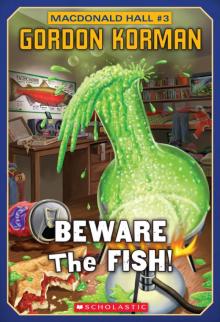 Beware the Fisj
Beware the Fisj Slacker
Slacker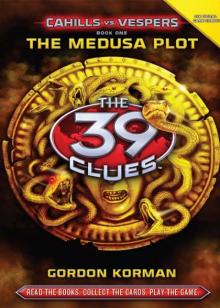 The Medusa Plot
The Medusa Plot This Can't Be Happening at MacDonald Hall!
This Can't Be Happening at MacDonald Hall!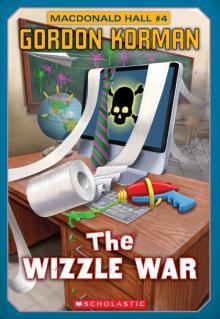 The War With Mr. Wizzle
The War With Mr. Wizzle The Emperor's Code
The Emperor's Code Zoobreak
Zoobreak The Danger
The Danger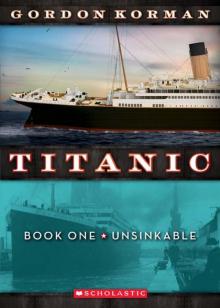 Unsinkable
Unsinkable Jake, Reinvented
Jake, Reinvented No More Dead Dogs
No More Dead Dogs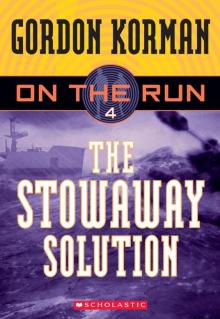 The Stowaway Solution
The Stowaway Solution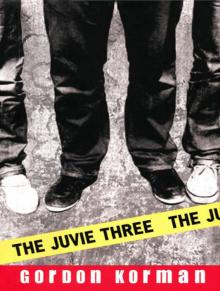 The Juvie Three
The Juvie Three The Climb
The Climb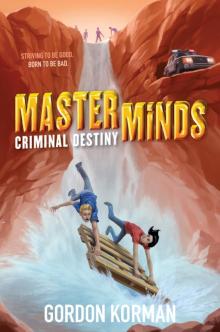 Criminal Destiny
Criminal Destiny Hideout: The First Adventure
Hideout: The First Adventure Flashpoint
Flashpoint Swindle
Swindle Pop
Pop The Rescue
The Rescue Memory Maze
Memory Maze The Sixth Grade Nickname Game
The Sixth Grade Nickname Game Vespers Rising
Vespers Rising Collision Course
Collision Course The Abduction
The Abduction Losing Joe's Place
Losing Joe's Place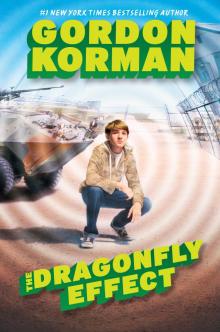 The Dragonfly Effect
The Dragonfly Effect The Hypnotists
The Hypnotists Survival
Survival Lights, Camera, DISASTER!
Lights, Camera, DISASTER! Payback
Payback Ungifted
Ungifted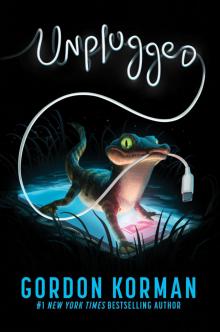 Unplugged
Unplugged Framed
Framed Supergifted
Supergifted Masterminds
Masterminds Jackpot
Jackpot Don't Care High
Don't Care High The Deep
The Deep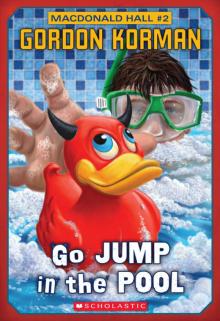 Go Jump in the Pool!
Go Jump in the Pool! The Contest
The Contest Public Enemies
Public Enemies Hideout: The Second Adventure
Hideout: The Second Adventure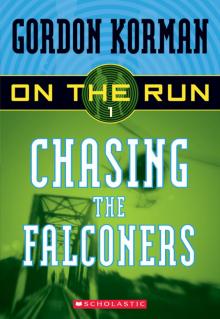 Chasing the Falconers
Chasing the Falconers One False Note
One False Note Shipwreck
Shipwreck Jingle
Jingle Unleashed
Unleashed Son of the Mob
Son of the Mob Now You See Them, Now You Don't
Now You See Them, Now You Don't War Stories
War Stories Schooled
Schooled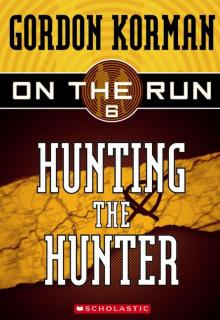 Hunting the Hunter
Hunting the Hunter The Zucchini Warriors
The Zucchini Warriors A Semester in the Life of a Garbage Bag
A Semester in the Life of a Garbage Bag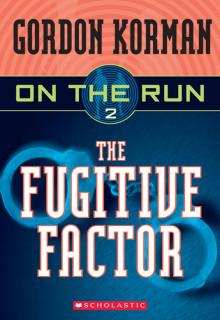 The Fugitive Factor
The Fugitive Factor Born to Rock
Born to Rock The Summit
The Summit Showoff
Showoff The Unteachables
The Unteachables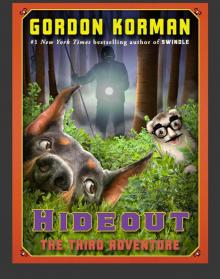 The Third Adventure
The Third Adventure The Joke's on Us
The Joke's on Us Linked
Linked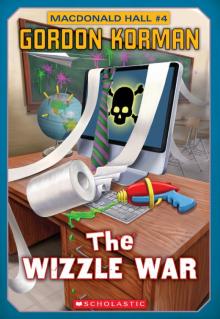 The Wizzle War
The Wizzle War The 6th Grade Nickname Game
The 6th Grade Nickname Game The Second Adventure
The Second Adventure The First Adventure
The First Adventure![39 Clues : Cahills vs. Vespers [01] The Medusa Plot Read online](http://i1.bookreadfree.com/i2/04/10/39_clues_cahills_vs_vespers_01_the_medusa_plot_preview.jpg) 39 Clues : Cahills vs. Vespers [01] The Medusa Plot
39 Clues : Cahills vs. Vespers [01] The Medusa Plot